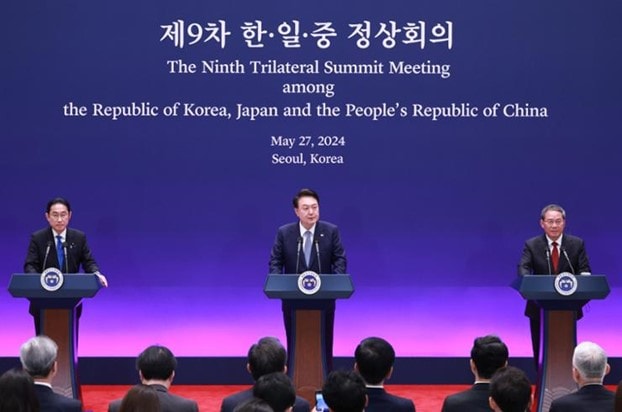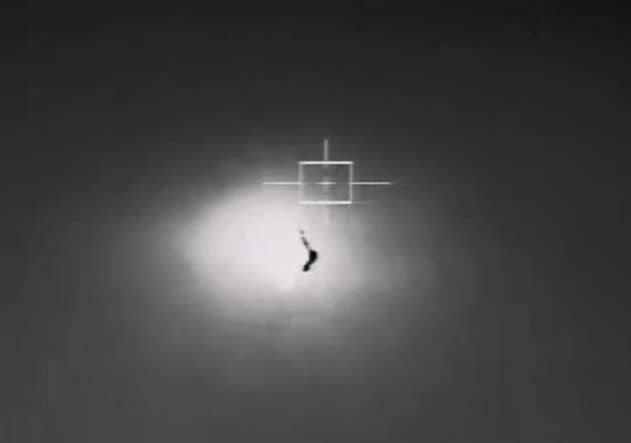On May 26 and 27, 2024, the leaders of China, Japan, and South Korea met in Seoul for the Ninth Trilateral Summit,[1] the first gathering at such a level since 2019, marking the resumption of "the long-stalled"[2] trilateral summit.[3]
Chinese media outlet Xinhua stated that the three-way meeting of South Korean President Yoon Suk Yeol, Chinese Premier Li Qiang and Japanese Prime Minister Fumio Kishida "sent positive signals to the world and manifested the will of the three countries to further collaborate." Xinhua further stressed that "the resumption of China-Japan-South Korea cooperation is of vital importance to help improve the trio's relations."[4] Yet, Korean media outlet Korea Times described the meeting as "disappointing" and stressed that the "high-stakes trilateral summit" "failed to completely mend strained relations between Seoul and Beijing."[5] As mentioned by The Korea Herald, despite close economic and cultural ties, "the three countries are locked in a complex web of conflicting interests around North Korea, the US-China trade war, China's assertiveness over Taiwan and Japan's history of colonial occupation and wartime aggression."[6] Also Japanese media outlet Asahi Shimbun stressed that, at the summit, "differences in approaches on security issues between the Japan-South Korea camp and China became clear."[7]

(Source: Korea Times)
Korean Expert: "The Summit Has Done Little, If Anything, To Bridge The Divergent Positions" Between South Korea And China
Commenting on the fact that the trilateral meeting's goal was to establish a high-level diplomatic and security dialogue and discuss the second stage of free trade agreement (FTA) negotiations, Korean expert Chung Jae-heung, who is director of the Center for Chinese Studies at the Sejong Institute, stated: "The summit has done little, if anything, to bridge the divergent positions between the two sides. It was more symbolic than substantive... I do not consider the agreement to resume talks on the second stage of the FTA a significant achievement of the summit, as such agreements could have been reached through meetings between top economic officials, without the need for a leaders' summit."
Korean Media Outlets: China Is Reluctant "To Actively Engage In Addressing Pyongyang's Nuclear Threats"
However, the main issue that was pointed out by Korean experts was China's reluctance "to actively engage in addressing Pyongyang's nuclear threats."[8] At the end of the trilateral summit, a joint declaration read: "We reiterated positions on regional peace and stability, denuclearization of the Korean Peninsula and the abductions issue, respectively."[9]
The Korean media outlet Chosun Daily noted that the language of declaration was a significant step back from the past when clearer language was used, such as "We promise the complete denuclearization of the Korean Peninsula" (2018) and "We strive for the complete denuclearization of the Korean Peninsula" (2019).[10]
Chosun Daily further stressed that South Korea does not have any nuclear weapons, so the term "denuclearization of the Korean Peninsula" is "somewhat misleading as it seems to refer to both North and South Korea." "The more accurate term would be 'denuclearization of North Korea,' but China has used the ambivalent phrase 'denuclearization of the Korean Peninsula,'" the Chosun Daily wrote.
The Chosun daily then added: "China's stance on North Korea's nuclear program has notably regressed as U.S.-China tensions intensified over the past four years. After joining Russia in submitting a UN Security Council resolution to ease sanctions on North Korea in 2021, China now opposes sanctions even when North Korea blatantly violates Security Council resolutions by launching ballistic missiles. Meanwhile, North Korea and Russia are trading arms, and Russia, a permanent member of the UN Security Council, used its veto to block the renewal of a UN panel that monitors sanctions against North Korea.
"North Korea currently possesses more than 45 nuclear weapons and continues to improve and enhance the capabilities of missiles and submarines to carry strategic and tactical nuclear warheads. With China, a permanent member of the UN Security Council, stepping back from enforcing sanctions, North Korea faces fewer international constraints. It would be significant if China reaffirmed the principle of denuclearization of the Korean Peninsula and committed to implementing UN Security Council resolutions in cooperation with South Korea and Japan. If China desires meaningful cooperation with South Korea and Japan, it must return to the basics of denuclearization and the implementation of UN resolutions, even if they are still far from complete."
Japanese Media Outlet: The Trilateral Summit Offers Opportunities For "Pragmatic Dialogue"
On Pyongyang's nuclear threats and its warning to be ready to launch a space rocket carrying a military reconnaissance satellite between May 27 and June 4,[11] Japanese media outlet Asahi Shimbun stressed: "At the outset of the meeting, the leaders of Japan and South Korea criticized North Korea for its announcement that it would launch a military reconnaissance satellite, but China's Premier, Li Qiang, did not directly mention the matter."[12]
It is worth noting that on May 28, 2024, North Korea's attempt to launch a space rocket carrying a military spy satellite ended in failure. 'The launch of the new satellite carrier rocket failed when it exploded in mid-air during the flight of the first stage,' the North's state-run Korean News Agency reported.[13]
Nevertheless, Asahi Shimbun stated that, while a "fundamental solution to the dispute seems unlikely in the near term" among the three countries, the Japan-China-South Korea framework offers the advantage "of creating opportunities for such pragmatic dialogue."[14]

This image shows the explosion of North Korea's purported military reconnaissance satellite, captured by a surveillance camera,on May 28, 2024. (Source: Ajupress.com)
Kyodo News further noted that, recently, China and Japan have been "at odds over trade," after Beijing "imposed a blanket ban on Japanese seafood imports in the wake of the release of treated radioactive wastewater from the crippled Fukushima Daiichi nuclear power plant that began in August 2023." In Seoul, Japanese PM Kishida asked China's Premier Li to lift the import ban. But Li expressed "Beijing's anxiety about the discharge, referring to the water as 'nuclear-contaminated.'"
Kishida also mentioned that Japan is "seriously concerned" about China's military drills around Taiwan, but Li stressed once again that Taiwan is at the "core of Beijing's interests and a red line that must not be crossed."[15]
Chinese Communist Party (CCP) Mouthpiece On South Korea's "Diplomatic Immaturity"
Commenting on the outcome of the meeting, the Chinese Communist Party (CCP) mouthpiece Global Times defined South Korea as "immature," as South Korean Vice Foreign Minister Kim Hong-kyun, Deputy Secretary of State Kurt Campbell of the U.S. and Japanese Vice Foreign Minister Masataka Okano are set to attend the trilateral dialogue in historic Little Washington, Virginia, at the end of May.
"It is likely that South Korean officials will share and report on the just-concluded China-Japan-South Korea trilateral summit meeting during the upcoming talks with the U.S., its most important military ally, according to Chinese observers. However, they also pointed out that the deliberate arrangement also reflected Seoul's diplomatic immaturity," the Global Times stated.[16]
The Chinese media outlet then added: "The nature of US-Japan-South Korea cooperation is fundamentally different from China-Japan-South Korea cooperation. The US has a security alliance with Japan and South Korea, covering military security, economic, social, and ideological aspects, whereas China and Japan, as well as China and South Korea, are merely partners, with frequent disputes... China's goal is not to compete with the US but to emphasize that US-Japan-South Korea cooperation should not target China and should not harm China's national interests."[17]
[1] Mofa.go.jp/a_o/rp/pageite_000001_00376.html, May 27, 2024.
[2] "The resumption of the diplomacy and security channel came after the two nations halted such meeting in 2016 when Korea and China clashed over the deployment of the THAAD missile system." See: Koreaherald.com/view.php?ud=20240527050767, May 28, 2024.
[3] Koreatimes.co.kr/www/nation/2024/05/113_375579.html, May 29, 2024.
[4] English.news.cn/20240529/2a6a246983084ec595acd0d3db5f1038/c.html, May 29, 2024.
[5] Koreatimes.co.kr/www/nation/2024/05/113_375579.html, May 29, 2024.
[6] Koreaherald.com/view.php?ud=20240527050767, May 28, 2024.
[7] Asahi.com/ajw/articles/15283223, May 28, 2024.
[8] Koreatimes.co.kr/www/nation/2024/05/113_375579.html, May 29, 2024.
[9] Koreatimes.co.kr/www/nation/2024/05/113_375579.html, May 29, 2024.
[10] Chosun.com/opinion/editorial/2024/05/28/WVSGEQ3ISRDRBBF7YINOCDH6FM/, May 28, 2024.
[11] "North Korea's attempt to launch a space rocket carrying a military spy satellite ended in failure, the renegade country said... The attempt came just several hours after Pyongyang informed of its plan to launch a satellite into orbit by June 4. 'The launch of the new satellite carrier rocket failed when it exploded in mid-air during the flight of the first stage,' the North's state-run Korean News Agency reported." See: Ajupress.com/view/20240528091217960, May 28, 2024; Kapantimes.co.jp/news/2024/05/27/japan/north-korea-satellite-launch-notice/, May 27, 2024. It is worth noting that, on May 30, 2024, North Korea fired a barrage "of suspected ballistic missiles toward its eastern sea, days after its attempt to launch a military reconnaissance satellite ended into failure. Source: Apnews.com, May 30, 2024.
[12] Asahi.com/ajw/articles/15283223, May 28, 2024.
[13] Ajupress.com/view/20240528091217960, May 28, 2024.
[14] Asahi.com/ajw/articles/15283223, May 28, 2024.
[15] English.kyodonews.net/news/2024/05/844fe5afa077-japan-s-korea-china-leaders-likely-to-agree-on-broad-cooperation.html?phrase=china&words=China,China%27s, May 27, 2024.
[16] Globaltimes.cn/page/202405/1313160.shtml, May 28, 2024.
[17] Globaltimes.cn/page/202405/1313160.shtml, May 28, 2024.




